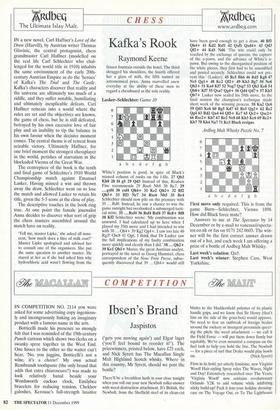Kafka's Rook
Raymond Keene
IN a new novel, Carl Haffner's Love of the Draw (Harvill), by Austrian writer Thomas Glavinic, the central protagonist, chess grandmaster Carl Haffner (modelled on the real life Carl Schlechter who chal- lenged for the world title in 1910) inhabits the same environment of the early 20th- century Austrian Empire as do the 'heroes' of Kafka's The Trial and The Castle. Kafka's characters discover that reality and the universe are ultimately too much of a riddle, and they suffer notable, humiliating and ultimately inexplicable defeats. Carl Haffner retreats into a world where the rules are set and the objectives are known, the game of chess, but he is still defeated, betrayed by his own excessive love of fair play and an inability to tip the balance in his own favour when the decisive moment comes. The central theme is of retreat from seizable victory. Ultimately Haffner, for one brief moment the strongest chessplayer in the world, perishes of starvation in the blockaded Vienna of the Great War.
The centrepiece of the book is the tenth and final game of Schlechter's 1910 World Championship match against Emanuel Lasker. Having missed a win and thrown away the draw, Schlechter went on to lose the match and allowed Lasker to retain his title, given the 5.5 score at the close of play.
The descriptive touches in the book ring true. At one point the female journalist Anna decides to discover what sort of grip the chess masters assembled around the match have on reality.
'Tell me, master Lipke,' she asked all inno- cent, 'how much does a litre of milk cost?' Master Lipke apologised and advised her to consult one of the organisms. She put the same question to another master. He stared at her as if she had asked him why hydrochloric acid wasn't flowing from the frozen fountain outside the hotel. The third shrugged his shoulders, the fourth offered her a glass of milk, the fifth named an astronomical price. Anna marvelled anew everyday at the ability of these men to regard a chessboard as the sole reality.
Lasker—Schlechter: Game 10 White's position is good, in spite of Black's massed column of rooks on the f-file. 27 Qb3 IChtt 28 14 g5 29 Qd3 Instead of this, Reuben Fine recommends 29 Rxe6 Nb8 30 Rc7. 29 ...gxf4 30 ext4 Qh4+ 31 Ke2 Qh2+ 32 Rf2 QhS+ 33 1113 Nc7 34 Rxc6 Nb5 35 Rc4 Schlechter should now pile on the pressure with 35 Rd8. Instead, he saw a chance to win the game outright but overlooked a submerged tacti- cal mine. 35 ...Rxf4 36 Bxf4 Rxf4 37 Rc8+ Bf8 38 Kf2 Schlechter wrote: 'My combination was unsound. I had calculated up to here when I played my 35th move and I had intended to win with 38 ... Qh4+ 39 Kg2 Qg4+. I saw too late 40 Rg3! QxcS 41 Qg6. I think that Dr Lasker saw the full implications of my faulty combination more quickly and clearly than I did.' 38 ...Qh2+ 39 Kel Qh1+ Marco, the great Austrian analyst, portrayed in the novel as Georg Hummel, chess correspondent of the Neue Freie Presse, subse- quently discovered that 39 ...Qh4+ would still have been good enough to get a draw. 40 Rfl Qh4+ 41 Kd2 Rxfl 42 Qxfl Qxd4+ 43 Qd3 Q12+ 44 Kdl Nd6 'The win could only be reached by the exchange of queens, the capture of the a-pawn, and the advance of White's a- pawn. But owing to the disorganised position of the white pieces, they first had to be assembled and posted securely. Schlechter could not pre, vent this.' (Lasker). 45 Rc5 11h6 46 Rd5 Kg8 47 Nc5 Qgl+ 48 Kc2 Qf2+ 49 Kb3 Bg7 50 Ne6 Qb2+ 51 Ka4 1U7 52 Nxg7 Qxg7 53 Qb3 Ke8 54 Qb8+ 1(17 55 Qxa7 Qg4+ 56 Qd4 Qd7+ 57 1033 Qb7+ Lasker now sealed his 58th move. In the final session the champion's technique made short work of the winning process. 58 Ka2 Qc6 59 Qd3 Ke6 60 Rg5 Kd7 61 Re5 Qg2+ 62 Re2 Qg4 63 Rd2 Qa4 64 Qf5+ KO 65 Qc2+ Qxc2+ 66 Rxc2+ Kb7 67 Re2 Nc8 68 Kb3 Kc6 69 Rc2+ Kb7 70 Kb4 Na7 71 Kc5 Black resigns
Ardbeg Malt Whisky Puzzle No. 7
First move only required. This is from the game Burn—Schlechter, Vienna 1898. How did Black force mate?
Answers to me at The Spectator by 14 December or by e-mail to vanessa@specta- tor.co.uk or fax on 0171 242 0603. The win- ner will be the first correct answer drawn out of a hat, and each week I am offering a prize of a bottle of Ardbeg Malt Whisky.
Last week's solution: Qa5.
Last week's winner: Stephen Cass, West Yorkshire.


























































































 Previous page
Previous page